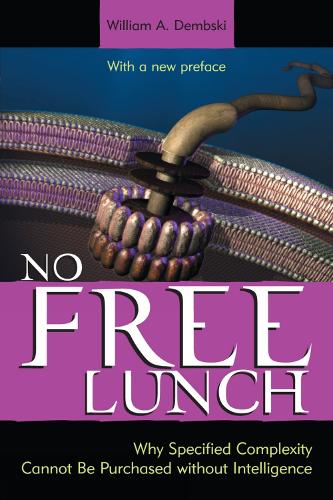
No Free Lunch: Why Specified Complexity Cannot Be Purchased without Intelligence
(Paperback)
Publishing Details
No Free Lunch: Why Specified Complexity Cannot Be Purchased without Intelligence
By (Author) William A. Dembski
Bloomsbury Publishing PLC
Rowman & Littlefield Publishers
1st February 2007
United States
Classifications
General
Non Fiction
Evolution / Evolutionary biology
Popular science
576.801
Physical Properties
Paperback
432
Width 153mm, Height 225mm, Spine 33mm
630g
Description
Darwin's greatest accomplishment was to show how life might be explained as the result of natural selection. But does Darwin's theory mean that life was unintended William A. Dembski argues that it does not. In this book Dembski extends his theory of intelligent design. Building on his earlier work in The Design Inference (Cambridge, 1998), he defends that life must be the product of intelligent design. Critics of Dembski's work have argued that evolutionary algorithms show that life can be explained apart from intelligence. But by employing powerful recent results from the No Free Lunch Theory, Dembski addresses and decisively refutes such claims. As the leading proponent of intelligent design, Dembski reveals a designer capable of originating the complexity and specificity found throughout the cosmos. Scientists and theologians alike will find this book of interest as it brings the question of creation firmly into the realm of scientific debate.
Reviews
In No Free Lunch, William Dembski gives the most profound challenge to the Modern Synthetic Theory of Evolution since this theory was first formulated in the 1930s. I differ from Dembski on some points, mainly in ways which strengthen his conclusion. -- Frank J. Tipler, professor of mathematical physics, Tulane University; coauthor of The Anthropic Cosmological Principle; and author of The Physic
In this book, William Dembski takes his statistical work on inferring design and translates it into an information-theoretic apparatus relevant to understanding biological fitness. In doing so, he has brought his argument for intelligent design into a domain that overlaps current work in evolutionary biology. As I see it, this is a landmark for intelligent design theory because, for the first time, it makes it possible to objectively evaluate the claims of evolutionary biology and intelligent design on common ground. -- Martin Poenie, associate professor of biology, University of Texas at Austin
Dembski lays the foundations for a research project aimed at answering one of the most fundamental scientific questions of our time: What is the maximal specified complexity that can be reasonably expected to emerge (in a given time frame) with and without various design assumptions -- Moshe Koppel, professor of mathematics, Bar-llan University, Israel
This sequel to The Design Inference further enhances the credibility of Intelligent Design as a sound research program. Through solid historical and philosophical arguments, Dembski succeeds in showing how specified complexity reliably detects design. His critique of Darwinian and other naturalistic accounts of evolution is built on a set of powerful and lucid arguments; his formulation of an alternative to these accounts is simply compelling. -- Muzaffar Iqbal, author of Islam and Science and founder-president of the Center for Islam and Science (CIS)
The valid philosophical arguments and historical examples make the study really agreeable to a large audience. * Auss *
I disagree strongly with the position taken by William Dembski. But I do think that he argues strongly and that those of us who do not accept his conclusions should read his book and form our own opinions and counterarguments. He should not be ignored. -- Michael Ruse, Florida State University
No Free Lunch is written for scholars and is filled with equations and careful technical definitions. Much of the text, however, is accessible for a broad audience and the book should prove useful to anyone wishing to explore the degree to which intelligent design can be formulated in a mathematically rigorous way. * Research News and Opportunities In Science and Theology *
One of the best books available about ID. * Journal of Scientific Exploration *
Author Bio
William A. Dembski is associate research professor in the conceptual foundations of science at Baylor University and senior fellow with Discovery Institute's Center for the Renewal of Science and Culture in Seattle.
